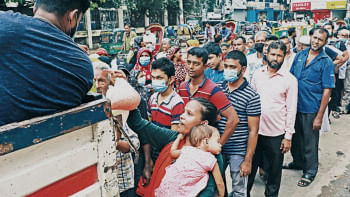The AL rehabilitates the BNP
It was our misfortune to have been born in Bangladesh. It doesn't matter which party is in office. We common citizens have always suffered, will always suffer."
That was a young man, speaking for himself and yet for many others like him, when asked for his response to the shutdown of the nation's capital by the government yesterday. The shutdown, of course, was caused by the government's misplaced belief that if things went on as usual, the opposition Bangladesh Nationalist Party would or might cause absolute chaos in the city through its political programme scheduled for March 12. That day has come and gone. And gone too, perhaps, is a huge swathe of public support for a political party which rode back to power three years ago on the strength of a four-fifths majority in parliament.
When you sit back and reflect on everything that happened prior to and on March 12, you ask yourself why a putatively democratic government chose to act the way it did on the day. No buses traveling toward Dhaka were allowed into the city. No launches were permitted to dock at their designated spots at Sadarghat. For a while, their passengers could get on to boats and touch land. That too stopped when ruling party goons made sure that boatmen did not approach the river vessels. Within the city, all significant modes of public transport stayed off the roads. Tens of thousands of citizens, men and women, people who have over the decades placed faith in democracy, were compelled into watching democracy mutate into sheer insensitivity at the hands of the powers that be.
And then came the falsehood of it all. The minister of state for home denied any government role in a suspension of transport movement to and within the capital. Earlier, the minister for home went dismissive about a circular in the police department relating to what ought to be done about handling the opposition rally. Senior leaders of the Awami League waxed eloquently untrue about the reasons behind the action against the opposition. It was to prevent the BNP from creating chaos that such cautionary action had become necessary, said they.
On the streets, in homes, in offices not a soul was around to defend the actions of this Awami League government. Perhaps the man who needed to be present at his workplace despite all this absence of transport said it best. "If the authorities could decree a suspension of road communication, they might very well have ordered offices closed," he mused bitterly. But the government did not do that. It appeared to be offering a curious philosophy of life: no vehicles will operate and no offices will remain closed. It conveniently forgot the poor, deprived, huddled masses.
There were other bitter, secular voices who made themselves heard on March 12, on the day before it. This is not the Awami League we voted for, they said in plaintive tones. This is not the Awami League we know. Which pushes your imagination into newer territories of inquiry: when was there ever a time when Bangabandhu and his generation of Awami League leaders turned away from the people and went about trying to swat their political adversaries down? They fought their own wars, but they made sure that the people did not become collateral damage. In the old days, it was always the people the Awami League spoke for and stood by. On March 12, on the days preceding it, the Awami League simply did not care. All it wished to see done was for the BNP to be forced into a position of genuflection before it. The BNP could not be given space.
And yet the truth today is that it is the Awami League which has rehabilitated the BNP, which has almost ensured that a party which indulged in unprecedented corruption in the five years till October 2006 returns to office at the next election with a vengeance. In these past three years, with a purposeful, clean government in charge, the corrupt elements of the BNP as also of the ruling Awami League should have been brought to justice. Had the Awami League governed well, it could have initiated serious investigations into allegations of Pakistani ISI money flowing into the BNP's electoral coffers. The prime minister accuses the BNP of collaboration with the intelligence services of a state we ran out of our land forty one years ago and yet will do nothing to act.
But her government has acted, in a bizarre way, through placing citizens at the mercy of politicians, her party's politicians. Her government has infuriated citizens through informing them in so many words that their self-esteem is of little consequence, that they can walk or sprint or run or crawl but they cannot complain.
The consequences of such hauteur you can now see before you. Suddenly it is a BNP made resurgent by a bumbling ruling party. Khaleda Zia is no more the politician in a state of shock at loss of power. On March 12, as she addressed her party faithful, she let the message sink in that she was on her way back to office. Her self-assurance was unmistakable. Her politics may be wrong, her record in government is dismal and deeply embarrassing. But she knows that that sordid past may now be behind her, now that the Awami League is doing all it can to give her a third opportunity in the sun.

 For all latest news, follow The Daily Star's Google News channel.
For all latest news, follow The Daily Star's Google News channel. 



Comments